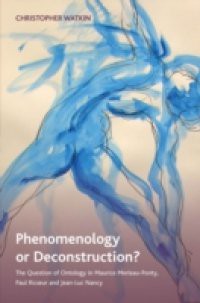Phenomenology or Deconstruction? challenges traditional understandings of the relationship between phenomenology and deconstruction through new readings of the work of Maurice Merleau-Ponty, Paul Ricur and Jean-Luc Nancy. A constant dialogue with Jacques Derrida's engagement with phenomenological themes provides the impetus to establishing a new understanding of 'being' and 'presence' that exposes significant blindspots inherent in traditional readings of both phenomenology and deconstruction. In reproducing neither a stock phenomenological reaction to deconstruction nor the routine deconstructive reading of phenomenology, Christopher Watkin provides a fresh assessment of the possibilities for the future of phenomenology, along with a new reading of the deconstructive legacy. Through detailed studies of the philosophy of Merleau-Ponty, Ricur and Nancy, he shows how a phenomenological tradition much wider and richer than Husserlian or Heideggerean thought alone can take account of Derrida's critique of ontology and yet still hold a commitment to the ontological. This new reading of being and presence fundamentally re-draws our understanding of the relation of deconstruction and phenomenology, and provides the first sustained discussion of the possibilities and problems for any future 'deconstructive phenomenology'.

